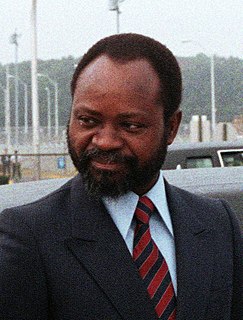A Quote by Samora Machel
The state must be the first to be organized and totally committed to serving the interests of the people. We must always be clear that the example is set at the top.
Related Quotes
The essence of the modern state is that the universal be bound up with the complete freedom of its particular members and with private well-being, that thus the interests of family and civil society must concentrate themselves on the state. It is only when both these moments subsist in their strength that the state can be regarded as articulated and genuinely organized.
Our government, National and State, must be freed from the sinister influence or control of special interests. Exactly as the special interests of cotton and slavery threatened our political integrity before the Civil War, so now the great special business interests too often control and corrupt the men and methods of government for their own profit. We must drive the special interests out of politics.
A critical, independent and investigative press is the lifeblood of any democracy. The press must be free from state interference. It must have the economic strength to stand up to the blandishments of government officials. It must have sufficient independence from vested interests to be bold and inquiring without fear or favour. It must enjoy the protection of the constitution, so that it can protect our rights as citizens.
The government should cultivate the view also among the propertyless classes of the population, those who are the most numerous and the least educated, that the state is not only an institution of necessity but also of welfare. By recognizable and direct advantages they must be led to look upon the state not as an agency devised solely for the protection of the better-situated classes of society but also as one serving their needs and interests.
To discover how much of our resources must be mobilized for war, we must first examine our political aim and that of the enemy. We must gauge the strength and situation of the opposite state. We must gauge the character and abilities of its government and people and do the same in regard to our own. Finally, we must evaluate the political sympathies of other states and the effect the war may have on them.
The good of the family cannot be achieved without consideration of an individual's important interests. If those interests are urgent and weighty, they must become important interests of the family and can sometimes have priority in case of conflict. Sometimes, members must split their differences in compromise. Over time, yielding to others at some times must be balanced against getting priority for one's interests at other times.
I was recently asked what it takes to become a writer. Three things, I answered: first, one must cultivate incompetence at almost every other form of profitable work. This must be accompanied, second, by a haughty contempt for all the forms of work that one has established one cannot do. To these two must be joined, third, the nuttiness to believe that other people can be made to care about your opinions and views and be charmed by the way you state them. Incompetence, contempt, lunacy—once you have these in place, you are set to go.







































